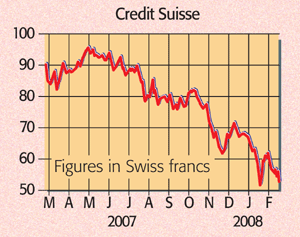Get the latest financial news, insights and expert analysis from our award-winning MoneyWeek team, to help you understand what really matters when it comes to your finances.
You are now subscribed
Your newsletter sign-up was successful
Want to add more newsletters?

Twice daily
MoneyWeek
Get the latest financial news, insights and expert analysis from our award-winning MoneyWeek team, to help you understand what really matters when it comes to your finances.

Four times a week
Look After My Bills
Sign up to our free money-saving newsletter, filled with the latest news and expert advice to help you find the best tips and deals for managing your bills. Start saving today!
What "teeth-clenchingly bad timing", as Patrick Hosking put it in The Times. Only 48 hours after Qatar's sovereign wealth fund piled into Credit Suisse, the Swiss bank's shares plunged by as much as 9% due to a shock $2.8bn writedown on mortgage-based derivatives, blamed on asset mispricing by traders. The write-off is 50% higher than the 2007 total announced only last week.
Confidence in the sector had already been undermined by reports that UBS, which has already lost $18bn on mortgage-related securities, could be facing another $10bn in losses this year.
Meanwhile, Germany's number-two bank Commerzbank's 2007 subprime losses doubled to e583m in the fourth quarter.
MoneyWeek
Subscribe to MoneyWeek today and get your first six magazine issues absolutely FREE

Sign up to Money Morning
Don't miss the latest investment and personal finances news, market analysis, plus money-saving tips with our free twice-daily newsletter
Don't miss the latest investment and personal finances news, market analysis, plus money-saving tips with our free twice-daily newsletter
Crdit Agricole, France's biggest retail bank, is now thought likely to announce another writedown of around e650m, owing to its exposure to US bond insurers on top of e2.5bn of losses so far.

Barclays is hardly out of the woods
Barclays, however, provided some much-needed cheer by reporting a 1% decrease in profits to £7bn for 2007 amid a credit crunch-induced hit of £1.6bn, only £300m more than estimated in November; it also signalled confidence by hiking its dividend by 10%. Barclays seems to have been "pretty nimble at quitting or hedging its riskiest positions", said Mike Verdin on Breakingviews.
But while it has cut its subprime risk, its exposure to Alt-A mortgages (a step above subprime), monolines and commercial mortgages has risen, and is vulnerable if these areas keep softening. With various credit exposures totalling £36.4bn, losses could "quickly eat away" profits, added the Daily Mail's Alex Brummer.
What next?
The G7 has pencilled in eventual subprime losses of up to $400bn, of which just $145bn or so have been disclosed; the complexity of valuing derivatives only adds to the uncertainty. Banks are also bracing themselves for losses that would follow from the downgrading of monolines, estimated at $20bn-150bn, while consumer debt and commercial property could wipe another $100bn-200bn off earnings. As a recent Barclays Capital report put it, "the write-downs and losses to date by no means represent the end of the story".
Get the latest financial news, insights and expert analysis from our award-winning MoneyWeek team, to help you understand what really matters when it comes to your finances.
MoneyWeek is written by a team of experienced and award-winning journalists, plus expert columnists. As well as daily digital news and features, MoneyWeek also publishes a weekly magazine, covering investing and personal finance. From share tips, pensions, gold to practical investment tips - we provide a round-up to help you make money and keep it.
-
 How a ‘great view’ from your home can boost its value by 35%
How a ‘great view’ from your home can boost its value by 35%A house that comes with a picturesque backdrop could add tens of thousands of pounds to its asking price – but how does each region compare?
-
 What is a care fees annuity and how much does it cost?
What is a care fees annuity and how much does it cost?How we will be cared for in our later years – and how much we are willing to pay for it – are conversations best had as early as possible. One option to cover the cost is a care fees annuity. We look at the pros and cons.

